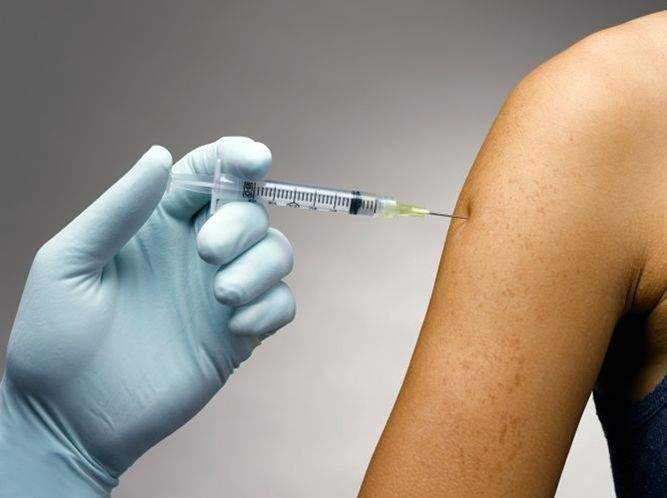In 2006, Carmen Emery endured a bad case of shingles—just before the vaccine became available. She spent months in agonizing pain. Afterward, she got the shot as soon as she could and encouraged family and friends to get theirs too.
“I’ve told everyone to get the vaccine,” Emery said. “If they’re not convinced, I’ll show them the scars on my back.”
Now Emery is staying up to date on the recommended vaccinations for older adults. Most recently, she got the respiratory syncytial virus (RSV) vaccine to protect herself as well as her husband, who has asthma and other chronic lung issues.
Unfortunately, many older adults aren’t following Emery’s example. Only about one-quarter of adults ages 65 and up in the United States are getting all of their recommended vaccinations, according to the 2022 National Health Interview Survey (NHIS).
“Substantial improvement in adult vaccination uptake is needed to reduce the burden of vaccine-preventable diseases nationally,” according to the NHIS report. “Increasing the proportion of adults who receive recommended age-appropriate vaccines … is a high-priority public health issue.”
Study after study confirms that vaccines keep older adults healthier and less susceptible to hospitalization, severe illness and death, according to Judith Ford, MD, chief clinical officer for Archwell Health, a primary care company for adults 60 and older. She ticks off a list: COVID vaccines reduced deaths by 59 percent from December 2020 to March 2023, when 96 percent of the casualties were who died were over 60; the RSV vaccine is up to 80 percent effective in preventing hospitalization among immunocompromised adults over 60; patients vaccinated with the flu shot had a 26 percent lower rate of ICU admission and 31 percent lower risk of death.
Changing Immune Systems
As people age, their immune systems naturally weaken—a process called immunosenescence. This decline makes it harder for the body to fight off infections, leaving older adults more vulnerable to severe illness or even death. That’s why, when the flu sends hundreds of thousands to the hospital and causes tens of thousands of deaths, the majority of them are older adults. Vaccines provide a crucial defense.
Most older adults know the drill when it comes to annual flu shots and the widely publicized COVID-19 vaccines and boosters, but not all are aware of the growing list of vaccinations recommended by the Centers for Disease Control for people 50 and up.
In August 2024, the CDC updated its guidelines to recommend a single dose of the RSV vaccine for adults 75 and older, or 60 and up for those living in residential facilities or with high-risk conditions.
“Over the past decade or so, we’ve been seeing increasingly severe RSV infections in our older adult patients,” said Laurie Archbald-Pannone, MD, associate professor of geriatrics at the University of Virginia School of Medicine. A study published in JAMA in 2024 showed that vaccinated older adults were 75 percent less likely to be hospitalized for RSV compared to their unvaccinated peers.
The shingles vaccine was also added to the CDC’s list in recent decades. Zostavax debuted in 2006, followed by a more effective successor, Shingrix, in 2017. The CDC now recommends the Shingrix vaccine, given in two doses, for people over 50.
Other CDC-recommended vaccines include:
- COVID-19. The latest recommendation is for a second dose of the 2024-2025 booster for those over 65 who are moderately or severely immunocompromised. Some experts believe COVID boosters may become a yearly ritual, like flu shots. Both the COVID booster and flu shot may be administered at the same time.
- Pneumonia. The CDC recommends routine pneumococcal vaccines (PCV15, PCV20 or PCV21) for all adults ages 50 and up. Depending on the patient’s health situation, a second vaccination may be advised after age 65.
- High-dose flu shot. An annual flu shot is recommended for everyone six months and older; for those over 65, the CDC advises a high-dose version. (Pro tip: get the annual shot in the early fall, by late October. The flu season runs from October through March; it takes about two weeks for the vaccine to take effect.)
- Hepatitis B. The vaccine is recommended for people over 60 with risk factors, such as multiple sex partners or a history of sexually transmitted infections.
- Tetanus, diphtheria and pertussis (Tdap) booster. Most Americans receive this vaccination as children; the CDC recommends a booster every 10 years.
Undervaccination
The cost of most of these vaccines is covered by Medicare, or by private insurance for those under 65. (Coverage may vary for the shingles vaccine, which falls under Part D drug coverage for Medicare patients.) Vaccines are widely available at doctor’s offices, pharmacies, workplaces and community clinics.
Still, many older adults remain undervaccinated. For example, only 64 percent of adults 65 and up have received a pneumococcal vaccine, with disparities between white adults (69 percent vaccinated) compared to black (53 percent), Hispanic (42 percent) and Asian (50 percent) patients.
Barriers to vaccination include cost, needle phobia or lack of information on recommended vaccinations and how to obtain them. Barriers were more likely to affect older adults with less education, in racial minorities, or those living alone or in rural areas.
Another barrier: not all doctors proactively encourage vaccinations. And a doctor’s recommendation makes a big difference, according to Sean Ormond, MD, a pain management specialist in Glendale, AZ. Even his vaccine-hesitant patients are usually accepting—when he recommends vaccinations.
“Sometimes patients have heard myths about side effects or think they don’t need them,” Ormond said. “I try to take the time to explain the benefits. When patients understand how vaccines can protect them—not just from illness but also from pain and complications—they’re usually more willing.”
Ford frequently hears this refrain: “Oh, I never get the flu shot, it makes me sick.” However, none of the vaccinations recommended for older adults are live vaccines.
“They can’t cause disease; it’s biochemically impossible,” she said. “They might make you feel punky for a couple of days or give you a sore arm. But you’re not getting the disease. That’s your body building up immunity.”
Rare Reaction
After a bad reaction to the COVID-19 vaccine, Glenda Williams, 63, won’t be getting any COVID boosters or any of the other vaccinations recommended for older adults.
Williams (not her real name) did fine with the first shot, but the booster triggered a series of scary symptoms: panic attacks, itching, a burning sensation and vision loss. Her doctor diagnosed mast cell activation syndrome, an uncommon but documented reaction linked to the COVID-19 vaccine. Because she has Hashimoto’s disease, an autoimmune condition, the shot triggered irritation in her immune system. It took months, but dietary changes (eliminating foods with histamines) eventually cleared up most of the symptoms.
“I’m not an anti-vaxxer, even after what I went through,” she said. “But vaccinations are not for me.”
Older adults with chronic conditions or a history of reactions to vaccinations should talk with their physicians before proceeding with any of the recommended vaccinations. But at the same time, for those with conditions like COPD, asthma, kidney or other chronic illnesses, it’s especially critical to consider vaccinations to protect from respiratory diseases like COVID, flu, RSV and pneumonia.
“Vaccines are not always going to protect you 100 percent,” she said. “You may still get the disease, but the vaccine can make the difference between a mild case, or ending up in the hospital, or having long-term problems. In the case of COVID-19, for example, we know that people who are vaccinated are less likely to have long COVID.”
A great question for new or soon-to-be grandparents to ask themselves is, ‘What vaccines do I need to be updated on?’
— Edgar Navarro Garza, MD
Similarly, vaccinated patients who do contract shingles are less likely to suffer from postherpetic neuralgia, which can be debilitating.
Misinformation and conspiracy theories, which proliferated during the COVID-19 pandemic, have further muddied the picture in recent years.
“Unfortunately, vaccination has become a political issue, which drives me crazy because it’s not—it’s a medical issue,” Ford said.
Archbald-Pannone thinks the pandemic may have created some “vaccine fatigue,” but at the same time, it raised awareness about vaccinations that she hopes could help reverse the low vaccination rates among older adults.
“Coming out of the public health emergency, many of my patients have become really focused on what they can do to stay as healthy as possible, and some are much more proactive about staying up to date on their vaccinations,” she said.
For the Grandkids
Becoming a grandparent leads some older adults to revisit their vaccination schedules, according to Edgar Navarro Garza, MD, a pediatrician at Harbor Health in Austin, TX.
“A great question for new or soon-to-be grandparents to ask themselves is, ‘What vaccines do I need to be updated on?’” he said. “You want to be protected yourself, but also to protect your new grandchild. And it’s also important to encourage all your family members to be updated too.”
That’s one reason to consider the Tdap booster, which the CDC recommends every 10 years to prevent pertussis (whooping cough.) Some elementary schools in the United States have seen pertussis outbreaks in schools in recent years.
“If you’ve ever heard someone with pertussis, you never forget that cough,” Ford said.
Ford adds that additional vulnerability to illness is something that older adults share with babies and toddlers. Typically, children tend to be more vulnerable to different types of infections than older adults, but RSV is an exception.
“RSV is bimodal—it mostly affects children and seniors,” Ford said. Every year, RSV hospitalizes lots of babies and children as well as older adults; at peak season, entire wings of hospitals are filled with RSV cases.
Ford says she’ll continue to “bang the drum” for vaccinations.
“For every type of vaccine, the evidence is overwhelming,” she said. “We want to keep people out of the hospital. If they do go, we want their stay to be short, and we don’t want them in the ICU. Most importantly, we don’t want patients to succumb to these diseases. Vaccinations are a no-brainer.”

Freelance writer Mary Jacobs lives in Plano, TX, and covers health and fitness, spirituality, and issues relating to older adults. She writes for the Dallas Morning News, the Senior Voice, Religion News Service and other publications; her work has been honored by the Religion Communicators Council, the Associated Church Press and the American Association of Orthopaedic Surgeons. Visit www.MaryJacobs.com for more.



